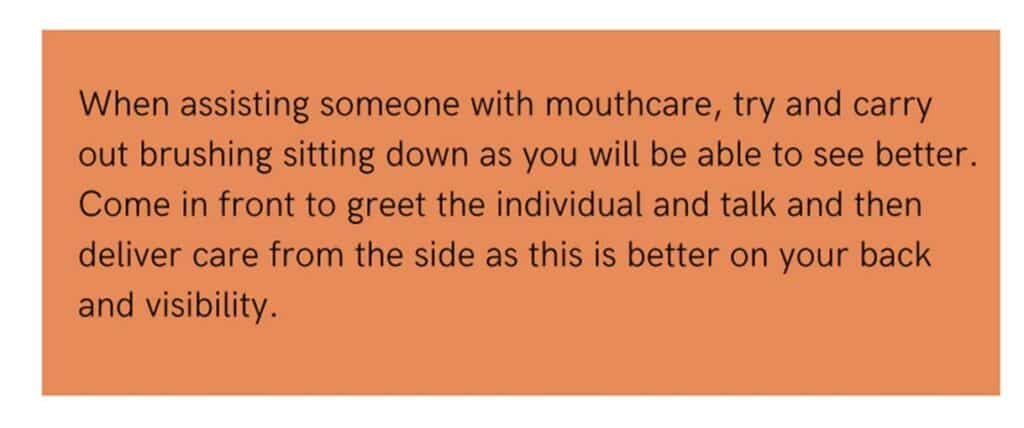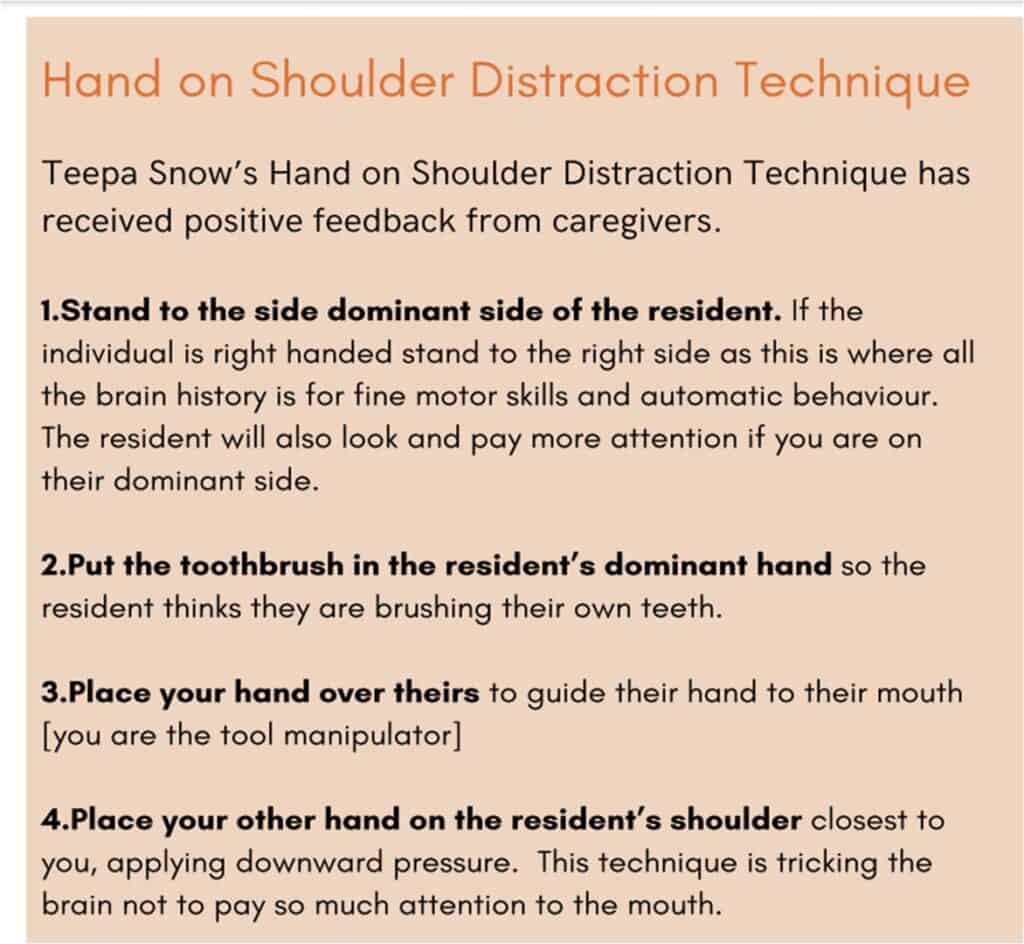
How to provide mouthcare for those who resist may not be something you have to think about unless you are a carer. Below are some Tips & Coping strategies from Mouth Care Without A Battle [University of North Carolina]. Unfortunately there is no one solution, and techniques which are found to be helpful may need to be adapted as a persons mental or physical health declines.
Mouthcare for those who can’t brush their own teeth, remove dentures to clean or explain that they are in pain is important for oral and overall health. For many who can’t take care of their own mouths prevention is the key to maintaining the ability to eat, speak, and smile. Visiting the dentist and receiving dental treatment can often be complex and stressful. Daily mouthcare will help prevent problems, reduce the need for dental treatment and maintain a healthy smile for life. These tips were developed for those with dementia but they can be adapted and applied for anyone who resists mouthcare.
As people advance with dementia they tend to become more resistant to mouth care making toothbrushing particularly challenging for carers and consequently result in carers are less likely to want to approach and carry out this part of personal care.
Encourage Independence
Do all you can to encourage as much independence as possible. You will find less resistance when carers encourage them to carry out their own oral care as it gives them a sense of control. [NHS Scotland tips and coping strategies]

- Bridging – ‘Follow my leader style’. Describe and show the toothbrush to the resident, mimic brushing your own teeth, give a spare toothbrush to the resident, and the resident may mirror your behaviour and brush their own teeth
- Chaining – this involves gently bringing the resident’s hand to the mouth while describing the activity. Let the resident continue if they are able.
- Hand over hand – if chaining is not successful, then place your hand over the resident’s and gently brush the teeth together.
- Distraction – Try singing or giving the person something to hold or do by placing a familiar item in the resident’s hand while you brush the resident’s teeth.
- Rescuing – Sometimes having someone new (rescue) take over the task works bringing a different approach, different manner which may encourage the resident to cooperate.
- Timing – The morning may simply not be the best time. Having oral care after medication and breakfast may be better.
Breaking the task down – It maybe that one side of the mouth gets brushed in the morning and the other side in the evening? Ensure that you note what area has been brushed so other staff are aware.
Read on for what to do when you are trying to provide mouthcare for those who resist.
If someone refuses to open
They may not understand you or may not want to have their teeth brushed.
- If the person is agitated then come back another time.
- If someone doesn’t open then stroke the side of the cheek to encourage them to open their mouth.
- Be reassuring
- Say what you are going to do before you do it. Touch the mouth, or teeth gently with the brush to prompt opeinng.
- Place the back of the toothbrush against the lips and gently twist it so it opens the lips and touches the front teeth. Start by cleaning the outer surfaces of the front teeth. Then move to their outer surfaces of the back teeth.
- Or…with a smile, say that you’ll come back later.
Biting the toothbrush
- If someone bites down on the toothbrush whilst brushing have another brush handy to continue brushing the teeth. This gives you access to the inside of the teeth.
- Gently rubbing the cheek or jaw – relaxes jaw to release the toothbrush.
Sucking the toothbrush
this is an instinctive reflex.
- Explain what you are doing, be gentle assure tehm you will be quick.
- Gently rub cheek to relax jaw muscles.
- Start by cleaning the outer surfaceds of the front teeth. Then move to the outer surfaces of the back teeth.
- Ask the person to say ‘ah’ for cleaning the biting and inside surfaces.
- Give positive feedback and encouragement.
If someone shows physical aggression
Come back later; pick another time of day when the person is calmer and more receptive.
- Try someone the person is more familiar and relaxed with.
- Be patient, take time and be reassuring.
- Do not talk about the person but always to the person.
- Explain what you are going to do and why you are going to do it.
- Stay calm and quiet yourself.
- Look in the mouth for any signs of soreness, infection, ulcers, broken teeth, cavities etc.
If unable to spit
- Dampen the toothbrush in mouthwash or use a smear of toothpaste, preferably non foaming.
- Put a cup under mouth although they may associate the cup with drinking and not spit into the cup but over it. If this is the case then put the person near a sink for spitting.
- Do not put addition fluid mouth in the mouth.
- Ensure that the individual is sat up.
- Use a gauze to remove excess fluid or use a suctioning toothbrush.
If someone grabs your hand
Grabbing hands is most common in the middle stage of dementia and amongst those with learning disabilities.
- Stop what you are doing. They may not understand so explain what you are doing or they may be in pain.
- They may want to do the brushing themselves. Give them the toothbrush, put your hand over theirs and guide them.
- If you notice bleeding, ulcers or sores be gentle and keep an eye on them.
What to do if someone continually refuses mouthcare
If a someone refuses mouth care on several consecutive attempts, seek advice from more senior carers or your dental team.
Who should consult with one of the following:
- Dementia Liaison or Community Mental Health teams.
- The individuals dentist if they have one or healthcare professional.
- Your local NHS Dental Helpline for advice and information on which dentists in your area can help.
More information and advice can be found at Knowledge Oral Health Care.


